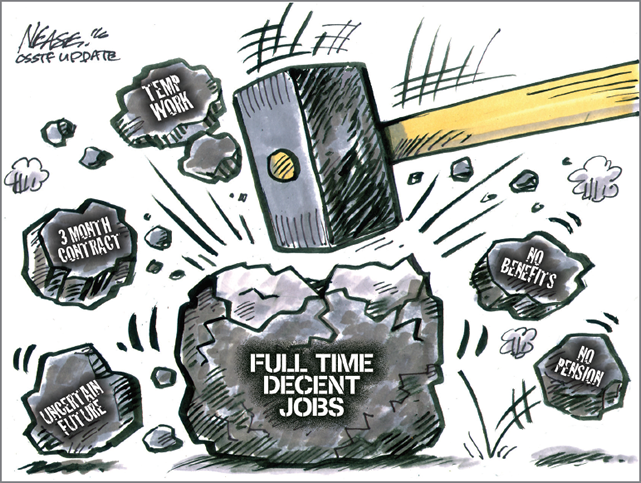Over the past few years a chorus of credible voices, including academics, labour leaders, economists and social activists, have been sounding the alarm over the increasing presence of precarity in the lives of working people in Canada. On the surface this would seem to be a trend that does not directly affect the majority of OSSTF/FEESO members. It’s certainly true, and should be of serious concern to all of us, that our occasional teacher members are all too familiar with the insecurity of unreliable part-time work and short-term contracts, and that an increasing number of support staff and university sector members are faced with the same reality. But it’s a measure of the success of our union that most OSSTF/FEESO members enjoy a high level of job security, with decent salaries, good benefits and a stable pension plan.
Why then should we, as a Federation and as individuals, be concerned about the growing prevalence of precarious employment in the broader economy? Is it not enough that we fight for better job security for our own members?
Part of the answer is that the labour movement is also a social justice movement, with a long history of fighting for the rights and security of all workers, unionized or not. And to that end, OSSTF/FEESO has supported and taken an active role in the Ontario Federation of Labour’s Make it Fair campaign, demanding progressive changes to the antiquated laws governing Ontario workplaces.
And, of course, the students we teach or work with every day are just a few years away from embarking on their own working lives, and none of us wants to see those students faced with years of uncertainty and financial instability in a world of minimal opportunity. Many of us will have the same concerns for our own children and other family members.

But the other reality we need to be aware of, if the current trend toward precarity continues, is that union members with stable work, decent pay, benefits and pensions will become increasingly isolated in a world where the vast majority of workers has none of those things. We have seen, in recent rounds of bargaining, the intense pressure exerted by employers eager to strip away provisions that we’ve bargained over decades. Those pressures will only increase if the accepted model for employment in the broader economy continues to slide toward insecurity, instability, low wages and minimal rights for workers.
Unfortunately, that slide will almost certainly continue unless we, along with other unions and social activists, make a concerted effort to convince governments to put some teeth back into the laws that govern the working lives of those who are not fortunate enough to have the protection of a strong union.
An indication of how difficult that work is going to be came in late October when the federal finance minister proclaimed that Canadians should get used to “job churn,” and said that high employee turnover and short-term contract work would continue to be the norm. The prime minister echoed those sentiments a few days later, saying that Canadians should now expect to have multiple careers, and suggesting that to expect otherwise was to have “an archaic vision” of one’s working life.
That our most prominent leaders, whether federal or provincial, are advising Canadians to accept an economy defined by precarious employment, rather than actively working to reverse that trend, should be alarming to all of us. It’s just one more reason why we need to do whatever we can to convince our elected representatives that employment laws need to be strengthened, and that the current trend toward precarious, low-wage work needs to be reversed. Because eventually that trend will negatively impact every one of us, union member or not.